- Home
- Muriel Spark
(1954) The Comforters Page 3
(1954) The Comforters Read online
Page 3
Laurence chuckled.
‘You said no bloody fear, I suppose.’
‘I said that I would not wish to have that poisonous woman in my house for a five-second visit. It fairly puts you against Catholics, a person like that.’
Laurence took up his pen again.
‘I detest that woman,’ said Louisa.
‘Grandmother is awake now,’ Laurence wrote. ‘She has been delivering herself of her views on Ma Hogg. “Poisonous” she says. It makes me rather sorry for the old Hogg being so dislikable. Truly, she has to be savoured to be believed.’
‘Tell Caroline,’ Louisa broke in, ‘to be careful of Mrs Hogg. Say she’s dangerous.’
‘I’ve told her,’ Laurence said.
He finished his letter, and read it over.
After tea he added to it, ‘P.S. I forgot to mention Grandmother’s cheque book. According to the stubs she donates the exact sum of her pension each week to the Prisoners’ Aid Society.’
He sealed the letter, then went to post it.
TWO
A storm, fierce enough to hold up the shipping at the mouth of the Mersey, ranged far enough inland to keep Caroline Rose indoors, where she paced the pale green corridors. Not for exercise but in order to think. A thinking-place of green corridors. The Pilgrim Centre of St Philumena.
‘Taking exercise.’ This was Mrs Hogg tacking on to her, infuriating. Taking exercise. Not a question, a statement.
‘Good afternoon,’ said Caroline.
‘And feeling lonely,’ said Mrs Hogg with her sort of smile. Feeling lonely, taking exercise. Caroline made no answer. The small perfect idea which had been crystallizing in her mind went all to mist. All right, I am at your disposal. Eat me, bloody well take the lot. I am feeling lonely. Rome has spoken.
‘Another time,’ said Mrs Hogg, ‘you don’t want to make a private Retreat. You want to come in the summer with one of the big pilgrimages for one of the big Feasts.’
‘Do I?’ Caroline said.
‘Yes,’ said Mrs Hogg. ‘That’s what you want to do. Please call me Georgina by the way. I’ll call you Caroline. Sometimes we have as many as a hundred and thirty pilgrims to stay. And of course thousands for the day pilgrimages. Sir Edwin and Lady Manders and Father Ingrid had no idea what they started when they started St Philumena’s. You must meet the Manders.’
‘I know them,’ said Caroline.
‘Oh, you do. Are you one of their converts? They are always making converts.’
‘Converts to what?’ said Caroline in the imperative need to be difficult. Caroline vented in her mind her private formula: You are damned. I condemn you to eternal flames. You are caput, as good as finished, you have had it, my dear. More expressive, and therefore more satisfying than merely ‘Go to hell’, and only a little less functional than a small boy’s ‘Bang-bang, you’re dead!’
‘Converts to the Faith, of course,’ Mrs Hogg was saying.
During her three days’ stay at St Philumena’s she had already observed Mrs Hogg. On her first evening Caroline overheard her:
‘You have to take what’s put before you here. Sometimes we have as many as a hundred and thirty pilgrims. Suppose a hundred and thirty people all wanted tea without milk —’
Her victim, a young lawyer who was recovering from dipsomania, had replied, ‘But I only say don’t trouble to put milk in mine.’
‘It isn’t what you say, it’s what you get.’
They sat later at a polished oak refectory table silently eating a suet-laden supper which represented the monastic idea at St Philumena’s. Their mouths worked silently, rhythmically, chew-pause-chew-pause-swallow-pause-chew. A sister from the convent next door was reading aloud the ‘holy work’ prescribed for mealtimes. Caroline recognized the Epistle of St John, and listened, fixing her eyes on the white blouse of Mrs Hogg opposite. Soon her mind was on Mrs Hogg, and the recent dispute about the tea. She began to take in the woman’s details: an angular face, cropped white hair, no eyelashes, rimless glasses, a small fat nose of which the tip was twitching as she ate, very thin neck, a colossal bosom. Caroline realized that she had been staring at Mrs Hogg’s breasts for some time, and was aware at the same moment that the woman’s nipples were showing dark and prominent through her cotton blouse. The woman was apparently wearing nothing underneath. Caroline looked swiftly away, sickened at the sight, for she was prim; her sins of the flesh had been fastidious always.
That was the first evening.
And this was the third day. At the end of the long corridor they turned. Caroline looked at her watch. Mrs Hogg did not go away.
‘The Manders converted you. They are always converting somebody.’
‘No. Not in my case, they didn’t.’
‘The Manders are very nice people,’ said Mrs Hogg defensively.
‘Charming people.’
‘Very good people,’ Mrs Hogg insisted.
‘I agree,’ said Caroline.
‘You couldn’t possibly disagree. What made you a Catholic then?’
‘Many reasons,’ Caroline said, ‘which are not too easy to define: and so I prefer not to discuss them.’
‘Mm… I know your type,’ Mrs Hogg said, ‘I got your type the first evening you came. There’s a lot of the Protestant about you still. You’ll have to get rid of it. You’re the sort that doesn’t mix. Catholics are very good mixers. Why won’t you talk about your conversion? Conversion’s a wonderful thing. It’s not Catholic not to talk about it.’
The woman was a funny old thing in her way. Caroline suddenly felt light-hearted. She giggled and looked again at her watch.
‘I must be going.’
‘Benediction isn’t till three o’clock.’
‘Oh, but I’ve come here for rest and quiet.’
‘But you’re not in Retreat.’
‘Oh yes, you know, I am in retreat.’ Then Caroline remembered that the popular meaning of ‘retreat’ in religious circles was an organized affair, not a private retiring from customary activities, so as to possess one’s soul in peace. She added, ‘I mean, I’ve retreated from London, and now I’m here for rest and quiet.’
‘You were speaking plenty to that young lawyer this morning.’
In her private neurotic amusement Caroline decided to yield. Ten more minutes of Mrs Hogg. The rain pelted with sudden fury against the windows while she turned to the woman with a patronizing patience.
‘Tell me about yourself, Mrs Hogg.’
Mrs Hogg had recently been appointed Catering Warden. ‘If it wasn’t for the Faith I couldn’t hold down the job. On my feet from six till two, then on again at three and then two hours’ break till supper and then there’s the breakfast to think about. And I’ve got a great number of Crosses. That young lawyer you ye got in with, the other night he said, “I don’t take milk in my tea” — did you hear him? Sometimes we have as many as a hundred and thirty. Suppose a hundred and thirty people wanted tea without milk —’
‘Well, that would be fairly easy,’ said Caroline.
‘Suppose they each wanted something different.’
‘All at the same time?’ said Caroline.
Seeing Mrs Hogg’s expression at this moment, Caroline thought, ‘Now it has struck her that I’m an enemy of the Faith.’
But Mrs Hogg righted herself; her mechanism was regulated for a chat.
‘I’ll tell you how I came here — it was a miracle. Our Lady sent me.’
But Caroline’s mood had changed again. Her sophisticated forbearance departed and constriction took its place; a pinching irritated sense of being with something abominable, not to be tolerated. She had a sudden intense desire to clean her teeth.
‘Oh tell me about the miracle,’ Caroline said. Her tone was slightly menacing. ‘Tell me all the details.’ These scatty women with their miracles. Caroline thought, ‘I hate all women and of all women Mrs Hogg. My nerves are starting up again. The next few eternal minutes are important. I must mind what I say. Keep aloof. Wa
tch my manners at all costs.’
‘Well,’ Mrs Hogg was saying, ‘I was of two minds whether to take a post in Bristol with a lady who was having her baby at home — I’m a registered midwife, you know, although most of my experience has been as a governess. One time I was housekeeper to a priest for two years. That was in Birmingham. He was sent to Canada in 1935, and when we said good-bye he said, “Well, Mrs Hogg —”‘
‘What about the miracle?’ said Caroline, and to cover up her testiness overdid it and added, ‘I can’t hear enough about miracles.’
And, privately she consoled herself with the words, ‘Little dear —for that was how she spoke to herself on occasion — ‘you will receive letters tomorrow morning from the civilized world.’
‘Well, you know,’ Mrs Hogg was saying, ‘to me it was a miracle. I was debating whether to take the job in Bristol or a permanent place in the north with a deaf lady. A letter arrived, it was a Tuesday morning, to say that the lady in Bristol had gone to hospital because of some complications, and was having her baby there. The husband sent me a week’s money. Then in the afternoon another letter arrived from the other place. No, I’m wrong, it was the next morning. The deaf lady had died. So there I was without a job. So I said to Our Lady, “What am I going to do now?” and Our Lady said, “Go back to St Philumena’s and think it over.” I’d already stayed at St Philumena’s on one of the big Retreats —’Did you actually hear a voice?’ Caroline inquired.
‘A voice?’
‘I mean, when you say, “Our Lady said”, do you mean she spoke audibly to you?’
‘Oh no. But that’s how Our Lady always speaks to me. I ask a question and she answers.’
‘How do you hear her answer, then?’
‘The words come to me — but of course you won’t know much about that. You have to be experienced in the spiritual life.’
‘How do you know the words come from the Blessed Virgin?’ Caroline persisted relentlessly. Mrs Hogg moved her upper lip into an indecent smile. Caroline thought: ‘She desires the ecstasy of murdering me in some prolonged ritualistic orgy; she sees I am thin, angular, sharp, inquiring; she sees I am grisly about the truth; she sees I am well-dressed and good-looking. Perhaps she senses my weakness, my loathing of human flesh where the bulk outweighs the intelligence.’
Mrs Hogg continued: ‘I know it was Our Lady’s message because of what happened. I came to St Philumena’s, and saw Lady Manders who was here just at that time. When I told her the position she said, “Now, there is a job for you here, if you like to try it. We want to get rid of the Catering Warden, she isn’t strong enough for the job. It’s hard work, but Our Lady would help you.” So I came for a month’s trial. That was in the autumn, and I’m loving it, every minute of it.’
‘That was the miracle,’ Caroline said.
‘Oh, it was a miracle. My arriving here just when Lady Manders wanted to make a change in the staff. I only came, really, to think things over. But I can tell you, I don’t have much chance to sit on my behind and think. It’s hard work. And I always put duty first, before everything. And I don’t mind the work; Our Lady helps me. When the kitchen girls grumble about the work, I always tell them, “Our Lady will do it for you.” And she does.’
‘In that case, there’s no need for them to do it,’ Caroline said.
‘Now listen to me, Caroline,’ said Mrs Hogg. ‘You want to speak to a priest. You haven’t really got the hang of the Catholic Faith. You want to speak to Father Ingrid.’
‘You are wrong,’ Caroline said. ‘I’ve heard him speaking once from the pulpit. Once was enough. I must go now.’
The bell was ringing for Benediction. ‘That’s not the way to the chapel,’ Mrs Hogg called after her as Caroline walked swiftly along the green-walled corridors.
Caroline did not reply. She went to her room and began to pack her things, neatly and calmly. St Philumena’s was a dead loss, Caroline told herself; ‘For one who demands much of life, there is always a certain amount of experience to be discarded as soon as one discovers its fruitlessness.’
She excelled at packing a suitcase. She told herself ‘I’m good at packing a suitcase’, forming these words in her mind to keep other words, other thoughts, from crowding in. The three days of St Philumena’s were bleating to high heaven for formulation, but she kept them at bay as she muttered, ‘Shoes there. Books here. The comb-bag in that corner. Blouses flat on the bed. Fold the arms. Like that. Then fold again. This way, that way. Hot-water bottle. Nothing rattling. Crucifix wedged in cotton wool. Catholic Truth Society pamphlet to read in the train. I am doing what I am doing.’
In this way, she subjugated St Philumena’s for half an hour. She had devised the technique in the British Museum Reading Room almost a year ago, at a time when her brain was like a Guy Fawkes night, ideas cracking off in all directions, dark idiot-figures jumping round a fiery junk-heap in the centre.
In the train Caroline swung her case on to the rack and sat down. The case jutted out at an angle. Caroline got up and pushed it straight. She had the carriage to herself. After a while she rose again and moved the case to the middle of the rack, measuring by the mirror beneath until there was an equal space on either side. Then she sat down in her corner-seat facing it. She sat perfectly still while her thoughts became blind. Every now and then a cynical lucidity would overtake part of her mind, forcing her to comment on the fury of the other half. That was painful. She observed, ‘The mocker is taking over.’
‘Very funny, very funny,’ said Caroline out loud. A woman just then passing in the corridor observed her talking to herself. Caroline thought, Good God, now my trouble is growing noticeable.
The shock of having been observed brought some relief. As her mental pain subsided, Caroline began to reflect. Am I justified?
I bloody well am. Carefully and intently she began to recollect what St Philumena’s had been like.
On her second evening when she had joined the other residents in the recreation-room, ‘I must remember they are called “pilgrims”,’ she thought. She had already made the blunder of referring to them as residents.’
Anyway, there were eight of them besides Caroline. She brought them one by one to mind as she sat, still as a telegraph post, in the train which carried her to London.
That evening she had looked very seldom at her fellow guests, but now revolting, she peered into their eyes, stared up and down at their clothes, scrutinized the very skin on their faces.
She recalled them, first singly, and then in a half-circle round the fireplace; she could even see herself.
And as the train chugged south, her memory dwelling continuously on the fireside group, while at the same time she repeated mentally the formula of the rosary, touched the beads imperceptibly in her pocket, which she did for its outward effect on her person, the automatic act of the rosary prevented her from fidgeting in her agitation, it stopped her talking aloud to herself, made her unnoticeable. For the group round St Philumena’s fire inflamed her; after all, she was a most jumpy woman at the best of times.
Two nights ago that group were exchanging anecdotes about the treatment of Catholics in England by non-Catholics. It was their favourite theme.
‘What do you think, they won’t employ Catholics on the passenger transport where my mother lives.’
‘Not one Catholic child got a scholarship …’
‘Forty per cent were Catholics, but not one …’
It was well known, said a large florid lady from the West of Ireland, that the University of Cambridge would not take Catholics.
‘Oh no, that’s not true,’ Caroline said at once.
‘And they do their best for to set the Catholics asunder,’ the lady from the West of Ireland went on.
‘Not noticeably,’ Caroline said.
The young lawyer agreed with her, but his testimony was suspect. The lady from Ireland whispered aloud to her neighbour.
‘He’s curing from alcohol, poor lad.’
; The lawyer added, ‘Of course, there’s always a prejudice in certain quarters,’ which put him right with the company.
‘My brother in the public library, when they found he was a Catholic …’
As the atrocities mounted up, the lady from the West of Ireland continued to ply Caroline, ‘What d’ye make of that?… Isn’t it awful? What d’ye think of it?’
At last, rising to leave, ‘I think it very quaint,’ Caroline answered.
Throughout, Mrs Hogg had been volubly present. She too had offered some relishes, had known what persecution was, and her eyes were frequently directed towards Caroline the suspect.
Recalling these proceedings, Caroline recalled too a similar fireside pattern, her family on the Jewish side with their friends, so long ago left behind her. She saw them again, nursing themselves in a half-circle as they indulged in their debauch of unreal suffering; ‘Prejudice!’ ‘… an outright insult!’ Caroline thought, Catholics and Jews; the Chosen, infatuated with a tragic image of themselves. They are tragic only because they are so comical. But the thought of those fireside martyrs, Jews and Catholics, revolted Caroline with their funniness. She thought she might pull the emergency cord, halt the train, create a blinding distraction: and even while planning this action she reflected that she would not positively perform it.
But in her own rapacity for suffering, Caroline seized and held the images of the world she had left years ago and the world she had newly entered. She tugged and pulled the rosary in her pocket, while her thoughts, fine as teeth, went into action again and again with the fireside congregations of mock martyrs, their incongruity beside the real ones … it was an insult.
It was in the dining-car that Caroline got round once more to Mrs Hogg. Mrs Hogg stuck in her mind like a lump of food on the chest which will move neither up nor down. Suddenly Caroline realized that she was bolting her lunch, and simultaneously the memory of mealtimes at St Philumena’s returned, with the sight of Mrs Hogg chewing in rhythm with the reading from the Scriptures delivered in the sister’s refined modulations: ‘Beloved, let us love one another, love springs from God… . If a man boasts of loving God, while he hates his own brother, he is a liar.., the man who loves God must be one who loves his brother.’

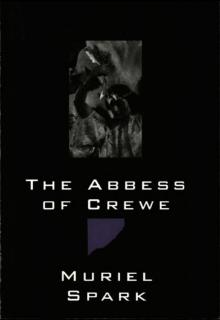 The Abbess of Crewe: A Modern Morality Tale
The Abbess of Crewe: A Modern Morality Tale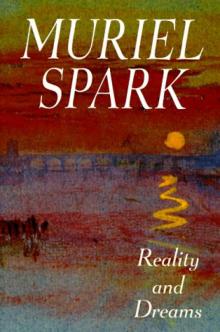 Reality and Dreams
Reality and Dreams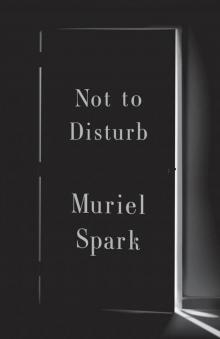 Not to Disturb
Not to Disturb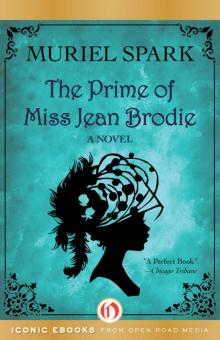 The Prime of Miss Jean Brodie
The Prime of Miss Jean Brodie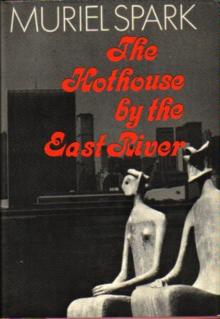 The Hothouse by the East River
The Hothouse by the East River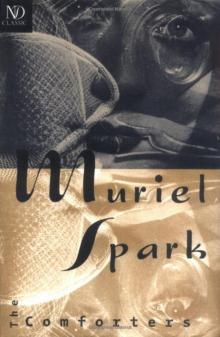 The Comforters
The Comforters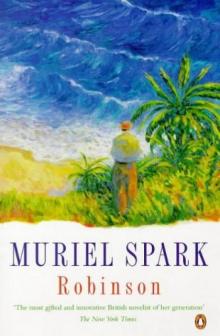 (1958) Robinson
(1958) Robinson Unknown
Unknown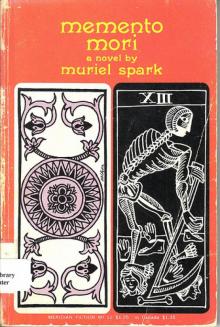 Memento Mori
Memento Mori The Finishing School
The Finishing School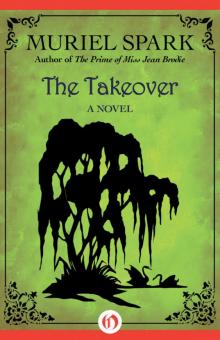 The Takeover
The Takeover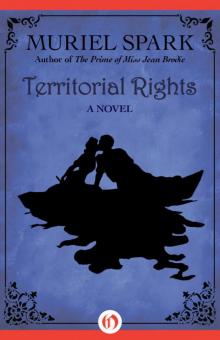 Territorial Rights
Territorial Rights The Complete Short Stories
The Complete Short Stories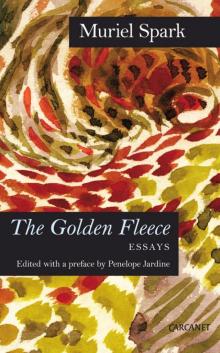 The Golden Fleece: Essays
The Golden Fleece: Essays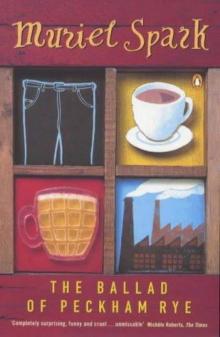 The Ballad of Peckham Rye
The Ballad of Peckham Rye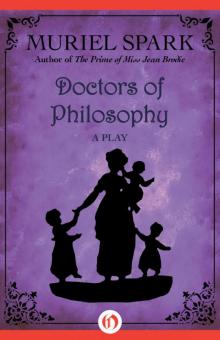 Doctors of Philosophy: A Play
Doctors of Philosophy: A Play The Mandelbaum Gate
The Mandelbaum Gate Loitering With Intent
Loitering With Intent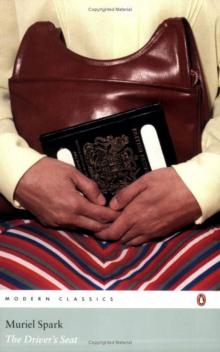 The Driver's Seat
The Driver's Seat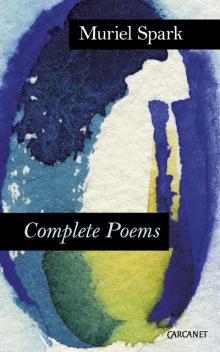 Complete Poems: Muriel Spark
Complete Poems: Muriel Spark Symposium
Symposium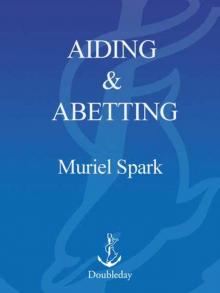 Aiding and Abetting
Aiding and Abetting The Golden Fleece
The Golden Fleece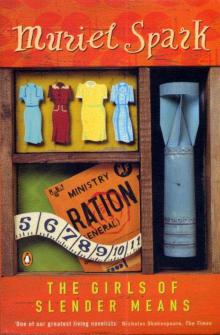 The Girls of Slender Means
The Girls of Slender Means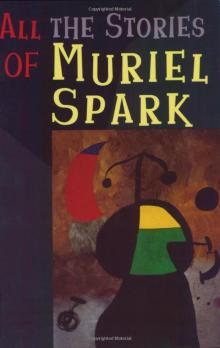 Alice Long’s Dachshunds
Alice Long’s Dachshunds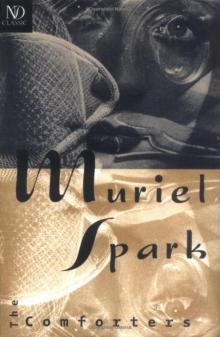 (1954) The Comforters
(1954) The Comforters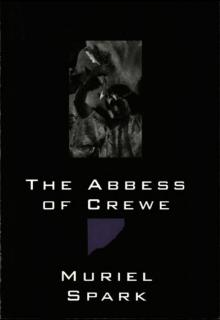 The Abbess of Crewe
The Abbess of Crewe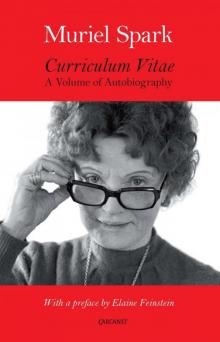 Curriculum Vitae
Curriculum Vitae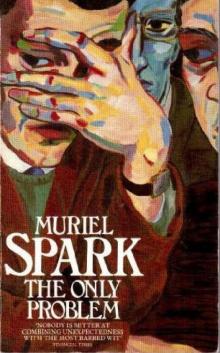 The Only Problem
The Only Problem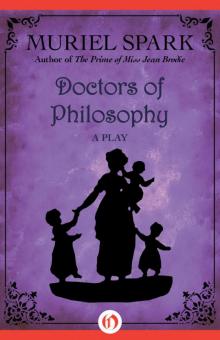 Doctors of Philosophy
Doctors of Philosophy